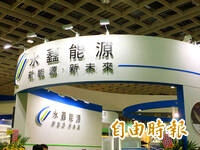《TAIPEI TIMES 焦點》 Tsai to reinvigorate ‘Asian tiger’ economy
DEFINED BY DIFFICULTY: The government has plans to increase regional economic integration and renew the nation’s role as a pioneer of innovation, the president said
/ Staff writer, with CNA
President Tsai Ing-wen (蔡英文) has vowed to turn Taiwan into “an Asian tiger” again in an article she wrote for The Economist’s special edition, “The World In 2017,” in which Tsai lays out her reform plans for the coming year.
Taiwan was a bright light in a sea of darkness, but lately, many Taiwanese feel that light has dimmed amid an uncertain global environment, she wrote in the article.
Tsai, who was elected president in January, said she assumed her presidential duties at a time of vast economic and political challenges, including slow economic growth, rising inequality and new security threats that are testing the world.
“Taiwan, no less than other nations, will be defined by how it responds to these difficulties,” Tsai, said.
Noting that her Democratic Progressive Party also holds a majority in the legislature, she said “we want to make Taiwan an Asian tiger once again.”
“My plan for 2017 is for Taiwan to renew its role as a pioneer, preserving our basic social safety net while revitalizing the economy with a new development model,” she said.
To that end, her administration will “simultaneously work to reform political institutions, ensuring that economic and social transformations are combined with transparency and a strong democratic culture,” she said.
To bolster the social safety net, Tsai said that her administration is pushing for pension reform aimed at creating a sustainable system and increasing support for the poorest in society.
Noting that the proportion of income spent on housing by Taiwanese has risen sharply amid a real-estate bubble, she said her administration would work to provide 200,000 units of affordable social housing by 2024 via a public-private investment plan.
In response to an aging population, her government would also build new community centers to care for senior citizens, she said.
“Our overall goal is to redistribute public resources for a fairer welfare system,” she said.
Her economic plan for next year focuses on upgrading industries and overcoming stagnation, by laying the groundwork for a more inclusive economic model based on innovation, job creation and the idea that growth should benefit all, not just a few, she said.
“Through ‘smart’ investment, the government is integrating public, private and global resources to nurture industries of the future: the ‘Internet of things,’ biotechnology, ‘smart’ machinery, ‘green’ energy and defense,” she said.
Her government is also working to refine Taiwan’s capital market and make financial policy more inviting to innovation-oriented foreign investment, provide greater support to entrepreneurs and tech start-ups and loosen regulations on foreign professionals, she said.
It is also important to help open new markets for Taiwanese products and services, she said, adding that she hopes to increase engagement with nations in Southeast Asia and South Asia, as well as Australia and New Zealand under the “new southbound policy.”
In terms of regional economic integration, she said Taiwan “will seek accession to the Trans-Pacific Partnership if and when it becomes available. We are also working toward bilateral agreements with important trading partners,” without indicating which ones.
Tsai said these all depend on a stable regional environment and she pledged to seek dialogue with all interested parties, including China, to build a framework for peace and prosperity in the Asia-Pacific region.
“My cross-strait policy is to establish consistent, predictable and sustainable relations under the existing constitutional framework,” she said.
Taiwan, South Korea, Singapore and Hong Kong were called the “Four Asian Tigers” from the 1970s to the 1990s because of their rapid economic growth.
新聞來源:TAIPEI TIMES















